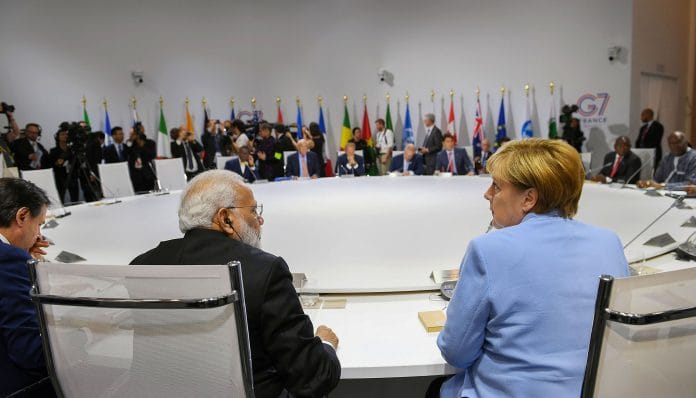New Delhi: The 2019 Group of Seven (G7) annual summit is currently underway in Biarritz, France. While the past two G7 summits failed to reach any meaningful breakthrough and the joint communiques were tarred with American objections, this year’s summit has fared even worse.
Considering the news reports coming out of Biarritz, this year’s G7 summit seems to be presenting contradictory views on almost everything that is on the agenda. More importantly, this “G7 is in disarray” and comes at a time when economic and geopolitical tensions between nations are high.
At a time, when the world would benefit from a genuine consensus among the advanced western democracies, the multilateral proceedings between them seem to entering into a new sink-hole.
Iran’s Foreign Minister Zarif shows up at G7
Perhaps the most surprising aspect of the 2019 G7 has been the arrival of Iranian Foreign Minister Mohammad Javad Zarif in Biarritz. Zarif met with French President Emanuel Macron on the sidelines of the summit.
There seems to be two available versions regarding an invitation to Zarif. Some French officials told The Financial Times that the US President Donald Trump was informed by Macron about Zarif’s visit. Both the UK and Germany were also informed and they gave their consent, according to the French officials.
A senior member from the European delegation, however, told The Financial Times that the invitation was a “stunt” pulled by Macron to provoke Trump.
According to a report in Politico, other G7-countries have backed France to issue a joint statement on their behalf with respect to Iran. But Trump soon contradicted Macron’s claim by remarking that each State would conduct its independent diplomacy with Tehran.
Include Russia or not?
The overall atmosphere of the meeting was reported to be tense, with leaders exchanging barbs. But the most contentious discussion was about the very nature of G7 going forward.
Here the basic disagreement was whether G7 should continue as a group of democracies or should it widen up to more authoritarian powers. This discussion was based on the termination and possible future inclusion of Russia in the G7.
While Trump prefers the latter option, European Council President Donald Tusk said that “under no condition” would he accept Russia’s inclusion.
Though Trump remarked that inviting Russia to next year’s G7, as a non-member attendee, was a real possibility.
Trade war continues
Even as the G7 summit is underway, there is a remarked escalation in the US-China trade war. This trade war has severely heightened uncertainty and is pushing the global economy towards a slowdown.
According to several media reports, there was palpable displeasure among other-G7 leaders regarding the trade war.
However, contrary to these reports Trump has tweeted several times that he had very productive meetings with G7 leaders.
During his bilateral meeting with UK Prime Minister Boris Johnson, Trump was asked if he regretted deepening the trade war. To which he replied: “Yeah, sure why not. Might as well. Might as well.”
The White House press secretary, however, refuted the media representation of Trump’s comments as regret.
Brexit conundrum, no progress really
The Brexit question seems to have met with a similar fate at this year’s G7.
A bilateral meeting was held between European Council’s President Donald Tusk and the UK Prime Minister Johnson.
After the meeting, Johnson said that substantial progress had been made on the Brexit negotiations and the chances of a deal were “improving”. While the European officials claimed that “absolutely nothing has changed”.






